新目标初中英语七年级下册短语语法汇总
- 格式:doc
- 大小:54.50 KB
- 文档页数:8

七年级下册1-3 单元重点词组总结(可打印)Unit 1 Can you play the guitar?词组必背1. play chess 下国际象棋2. speak Chinese /French 说汉语/法语/英语5 .be good at dancing 擅长跳舞……7.tell stories 讲故事9 show sb. Sth.=show sth. To sb..给某人看某物11 .play the violin拉小提琴12. Play the guitat 弹吉他18. make friends withsb. 与……交朋友20. On the weekend 在周末23. talk about sth. 谈论某事24 talk to sb.=talk with sb. 和.......谈话25 can speak a little English 会说一点儿英语26 need sb. To do sth 需要某人做某事27 tell sb. sth. =tell sth to sb.把某事告诉某人28. tell sb. to do sth. /Tell sb. not to do sth. 告诉某人(不要)做某事29. school show学校演出30. talk show 脱口秀31. talent show 才艺演出32. flower show 花展33. be good for sth./doing. 对…有益34. be bad for sth./doing对…有害35. be good/friendly to…对…友好36. be good with…/get on well with…对…有办法、与…相处得好、善于…打交道37. be busy with sth. / doing sth.忙于某事/做某事1. Want to do sth.想做某事2. Like playing the piano 喜欢弹钢琴3. Be good at telling stories 擅长讲故事4. Like doing sth.喜欢做某事5. Let’s join .... 让我们加入6. students wanted for School Show学校表演招聘学生7. After school放学后8. Need sb. To do sth. 需要某人做某事9. Help mother to cook 帮助妈妈做饭10. help my sister with English 帮助我妹妹学英语11. tell stories to sb. 给某人讲故事12. help for old people 对老人的帮助13. The students sports’ center学生的运动中心14. need help to teach music 需要帮助来教音乐Unit 2 What time do you usually go to school?1. go to school 去上学2. get up 起床3. get dressed 穿衣服4. brush teeth 刷牙5. eat breakfast 吃早饭6. take a shower 洗澡7. . at six thirty = at half past six 在六点半8. an interesting job 一个有趣的工作9. . at the radio station 在广播电视台10. at night 在夜晚11. a funny time 一个有趣的时间12. take exercise 锻炼13. be late for 迟到14. at about ten twenty 在大约十点二十15. on weekends 在周末on school days 在上学日16. .at. a quarter past three in the afternoon 三点过一刻17. at . a quarter to seven in the morning 七点差一刻18. . take a walk 散步19. . have much time 有许多时间20. . half an hour 半个小时21. get home 到达家22. . eat a good breakfast 吃一顿快餐23. . lots of /a lot of 许多24. be good for 对------有益25. taste good 尝起来好26. do her homework 做她的家庭作业27. have a healthy life 有一个健康的生方式28. eat breakfast 吃早餐29. go to work 去上班30. That's a funny time for…那是做……有意思的时间。

七下1—6单元必背句子与词组Unit1 Where’s your pen pal from? (ok)1. --你的笔友来自哪里? -- Where is your pen pal from? (无“实义动词e, 用is/are”) --他来自加拿大。
-- He/She is from Canada.同义句:-- Where does your pen pal e from? (有“实义动词e, 用do/does”) -- He/She es from Canada.来自:be from = e from练:They’re _______ Australia, a beautiful country.A. e fromB. es fromC. fromD. for2. --你的笔友来自加拿大吗?-- Is your pen pal from Canada? (用法同上)--是的。
-- Yes, he/she is.同义句:-- Does your pen pal e from Canada? (用法同上) -- Yes, he/she does.3. 他来自澳大利亚:He is from Australia. 他是澳大利亚人:He is Australian.4. --你的笔友住在哪里?-- Where does your pen pal live?--他住在多伦多。
-- He/She lives in Toronto.居住在某地:live in sp练:-- When _____ the girl _____ her homework? -- In the evening.A. does, doesB. does, doC. is, doD. is, does-- _______ your sister have a pen pal? Yes, she _______.A. Is, isB. Does, doC. Can, canD. Does, does-- Ling Tao is a Chinese, but now he _______ in the UK.A. liveB. isC. is fromD. es from5. --你的笔友说什么语言?-- What language does your pen pal speak?--他说英语。
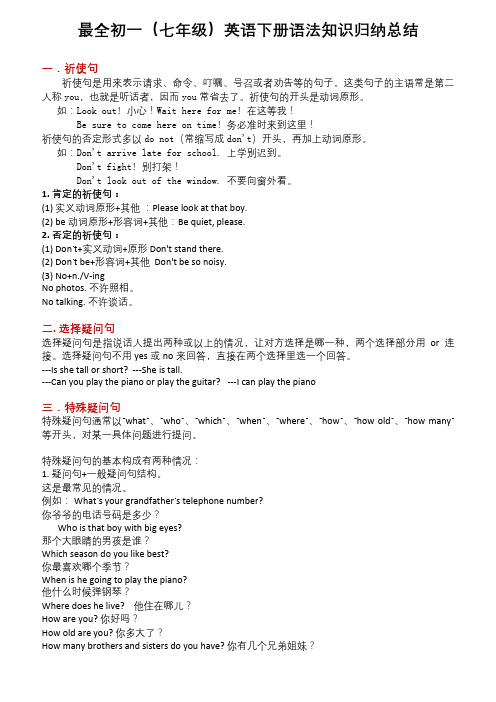
最全初一(七年级)英语下册语法知识归纳总结一.祈使句祈使句是用来表示请求、命令、叮嘱、号召或者劝告等的句子,这类句子的主语常是第二人称you,也就是听话者,因而you常省去了。
祈使句的开头是动词原形。
如:Look out! 小心!Wait here for me! 在这等我!Be sure to come here on time! 务必准时来到这里!祈使句的否定形式多以do not(常缩写成don't)开头,再加上动词原形。
如:Don't arrive late for school. 上学别迟到。
Don't fight! 别打架!Don't look out of the window. 不要向窗外看。
1. 肯定的祈使句:(1) 实义动词原形+其他:Please look at that boy.(2) be动词原形+形容词+其他:Be quiet, please.2. 否定的祈使句:(1) Don’t+实义动词+原形 Don't stand there.(2) Don’t be+形容词+其他 Don't be so noisy.(3) No+n./V-ingNo photos. 不许照相。
No talking. 不许谈话。
二. 选择疑问句选择疑问句是指说话人提出两种或以上的情况,让对方选择是哪一种,两个选择部分用or连接。
选择疑问句不用yes或no来回答,直接在两个选择里选一个回答。
---Is she tall or short? ---She is tall.---Can you play the piano or play the guitar? ---I can play the piano三.特殊疑问句特殊疑问句通常以“what”、“who”、“which”、“when”、“where”、“how”、“how old”、“how many”等开头,对某一具体问题进行提问。
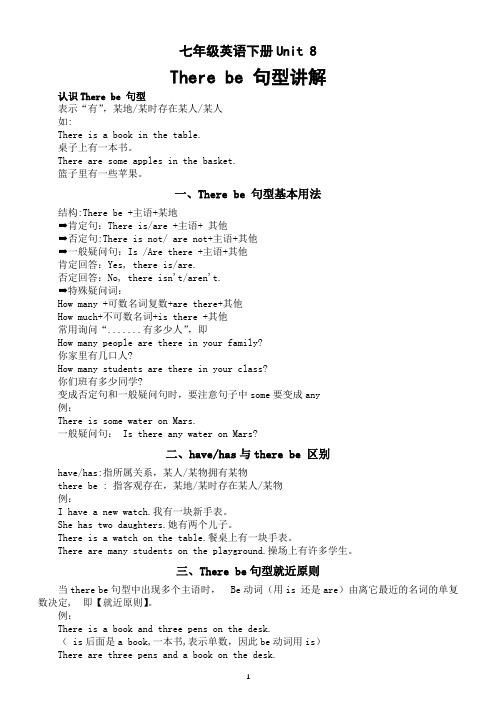
七年级英语下册Unit 8There be 句型讲解认识There be 句型表示“有”,某地/某时存在某人/某人如:There is a book in the table.桌子上有一本书。
There are some apples in the basket.篮子里有一些苹果。
一、There be 句型基本用法结构:There be +主语+某地➡肯定句:There is/are +主语+ 其他➡否定句:There is not/ are not+主语+其他➡一般疑问句:Is /Are there +主语+其他肯定回答:Yes, there is/are.否定回答:No, there isn't/aren't.➡特殊疑问词:How many +可数名词复数+are there+其他How much+不可数名词+is there +其他常用询问“.......有多少人”,即How many people are there in your family?你家里有几口人?How many students are there in your class?你们班有多少同学?变成否定句和一般疑问句时,要注意句子中some要变成any例:There is some water on Mars.一般疑问句: Is there any water on Mars?二、have/has与there be 区别have/has:指所属关系,某人/某物拥有某物there be : 指客观存在,某地/某时存在某人/某物例:I have a new watch.我有一块新手表。
She has two daughters.她有两个儿子。
There is a watch on the table.餐桌上有一块手表。
There are many students on the playground.操场上有许多学生。
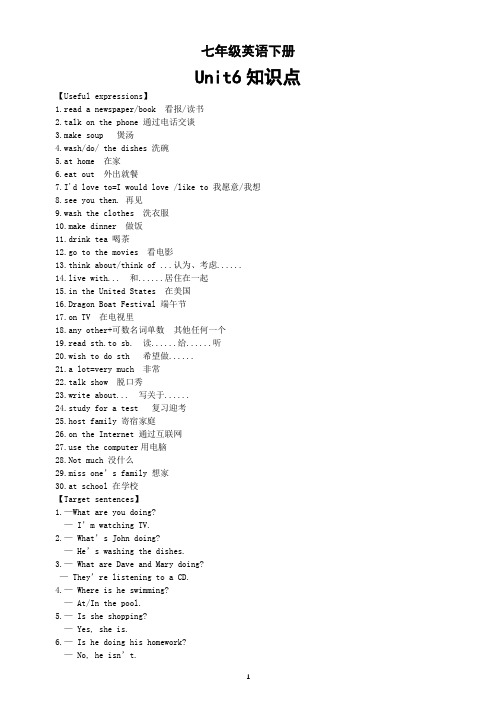
七年级英语下册Unit6知识点【Useful expressions】1.read a newspaper/book 看报/读书2.talk on the phone 通过电话交谈3.make soup 煲汤4.wash/do/ the dishes 洗碗5.at home 在家6.eat out 外出就餐7.I'd love to=I would love /like to 我愿意/我想8.see you then. 再见9.wash the clothes 洗衣服10.make dinner 做饭11.drink tea 喝茶12.go to the movies 看电影13.think about/think of ...认为、考虑......14.live with... 和......居住在一起15.in the United States 在美国16.Dragon Boat Festival 端午节17.on TV 在电视里18.any other+可数名词单数其他任何一个19.read sth.to sb. 读......给......听20.wish to do sth 希望做......21.a lot=very much 非常22.talk show 脱口秀23.write about... 写关于......24.study for a test 复习迎考25.host family 寄宿家庭26.on the Internet 通过互联网e the computer用电脑28.Not much 没什么29.miss one’s family 想家30.at school 在学校【Target sentences】1.—What are you doing?—I’m watching TV.2.—What’s John doing?—He’s washing the dishes.3.— What are Dave and Mary doing?—They’re listening to a CD.4.— Where is he swimming?— At/In the pool.5.— Is she shopping?— Yes, she is.6.— Is he doing his homework?—No, he isn’t.7.—Are you doing your homework?—No,I'm not.I'm cleaning my room.8.Do you want to join me for dinner?9.What do you think of his home in China?10.His dad and uncle are watching the boat races on TV.11.The mother is reading a story to her young children.12.He's talking on the phone to/with his cousin in Shenzhen.13.Zhu Hui misses his family and hopes to have his mom's delicious zongzi.14.But there's still no place like homehome.15.Zhu Hui loves New York and his host family a lot.【Language points】1.He is reading a newspaper.newspaper n.报纸为可数名词,“看报纸”要用read a newspaper.【易混辨析】in the newspaper与on the newspaperLook! Your photo is in the newspaper.看!你的照片上报纸了。
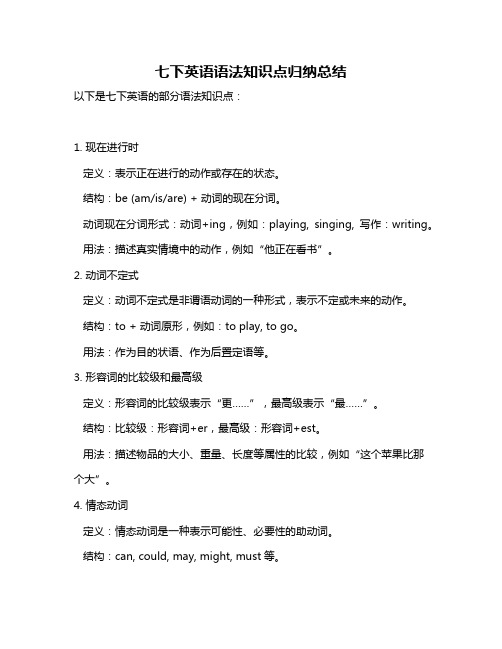
七下英语语法知识点归纳总结以下是七下英语的部分语法知识点:1. 现在进行时定义:表示正在进行的动作或存在的状态。
结构:be (am/is/are) + 动词的现在分词。
动词现在分词形式:动词+ing,例如:playing, singing, 写作:writing。
用法:描述真实情境中的动作,例如“他正在看书”。
2. 动词不定式定义:动词不定式是非谓语动词的一种形式,表示不定或未来的动作。
结构:to + 动词原形,例如:to play, to go。
用法:作为目的状语、作为后置定语等。
3. 形容词的比较级和最高级定义:形容词的比较级表示“更……”,最高级表示“最……”。
结构:比较级:形容词+er,最高级:形容词+est。
用法:描述物品的大小、重量、长度等属性的比较,例如“这个苹果比那个大”。
4. 情态动词定义:情态动词是一种表示可能性、必要性的助动词。
结构:can, could, may, might, must等。
用法:表示可能性,例如“他可能在这儿”;表示必要性,例如“你必须快点儿”。
5. 一般将来时定义:表示未来的动作或状态。
结构:will + 动词原形,例如:will go, will be。
用法:描述未来的计划、安排等,例如“明天我将要去公园”。
6. 一般现在时定义:表示现在的动作或状态。
结构:动词原形,第三人称单数形式为动词+s/es。
用法:描述日常习惯、事实等,例如“我每天早上跑步”。
7. 现在完成时定义:表示过去的动作对现在的影响或过去的动作持续到现在。
结构:have/has + 过去分词。
用法:描述已经完成的动作或状态,例如“我已经完成了作业”。
8. 时间介词和连词表示时间的介词:at, on, in;before, after;since等。
表示时间的连词:when, while等。
用法:描述时间关系,例如“我在上学的时候去了北京”。
9. 宾语从句和定语从句宾语从句:放在动词或介词后面的句子,充当宾语。

人教版(新目标)初中英语七年级下册Unit3Unit3 How do you get to school?Unit3 知识梳理◆短语归纳1. get to school 到达学校2. take the subway 乘地铁3. ride a bike 骑自行车4. how far 多远5. from home to school 从家到学校6. every day 每天7. take the bus 乘公共汽车8. by bike 骑自行车9. bus stop 公共汽车站10. think of 认为11. betweenand 在和之间12. one 11-year-old boy 一个11岁的男孩 13.play with 和玩14. come true 实现15. have to 不得不◆用法集萃1. taketo= go toby 乘去2. How do/does sb get to? 某人是怎样到的?3. How far is it fromto? 从到有多远?4. It takes sb. some time to do sth. 做某事花费某人多长时间。
5. How long does it take to do sth.? 花费多长时间?6. It is + adj. + to do sth. 做某事是7. Thanks for + n./Ving 感谢你(做)某事。
◆典句必背1. How do you get to school? 你怎么去上学?I ride my bike. 我骑自行车。
2. How far is it from your home to school? 从你家到学校有多远?3. How long does it take you to get to school? 去上学花费你多久?4. For many students, it is easy to get to school. 对很多学生来说,很容易到达学校。
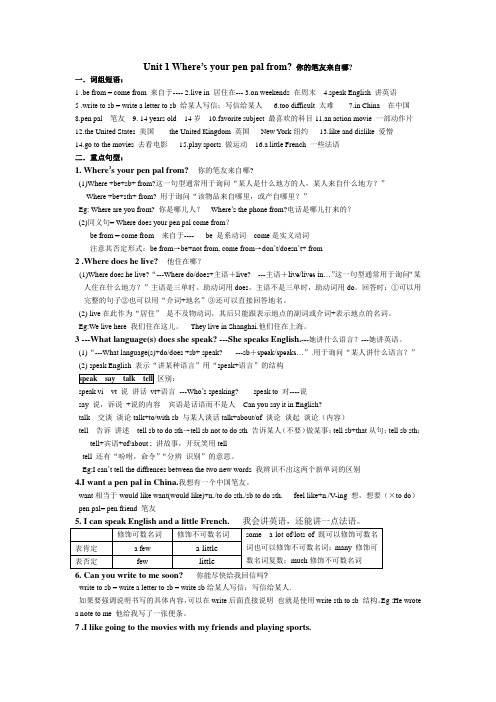
Unit 1 Where’s your pen pal from?你的笔友来自哪?一.词组短语:1 .be from = come from 来自于---- 2.live in 居住在--- 3.on weekends 在周末 4.speak English 讲英语5 .write to sb = write a letter to sb 给某人写信;写信给某人 6.too difficult 太难7.in China 在中国8.pen pal 笔友9. 14 years old 14岁10.favorite subject 最喜欢的科目11.an action movie 一部动作片12.the United States 美国the United Kingdom 英国New York纽约13.like and dislike 爱憎14.go to the movies 去看电影15.play sports 做运动16.a little French 一些法语二.重点句型:1. Where’s your pen pal from? 你的笔友来自哪?(1)Where +be+sb+ from?这一句型通常用于询问“某人是什么地方的人,某人来自什么地方?”Where +be+sth+ from? 用于询问“该物品来自哪里,或产自哪里?”Eg: Where are you from? 你是哪儿人?Where’s the phone from?电话是哪儿打来的?(2)同义句= Where does your pen pal come from?be from = come from 来自于---- be 是系动词come是实义动词注意其否定形式:be from→be+not from, come from→don’t/doesn’t+ from2 .Where does he live?他住在哪?(1)Where does he live? “---Where do/does+主语+live? ---主语+live/lives in…”这一句型通常用于询问“某人住在什么地方?”主语是三单时。

UNIT2 讲义第一部分 【重点短语】What time go to school get up take a shower brush one’s teeth get to do one’s homework go to work go home eat breakfast穿上衣服 上床睡觉要么……要么 take a walk大量;许多 radio station Bus station at night迟到 on weekends eat quickly play sports玩电子游戏 be good for Half past six it tastes good From to a quarter to six第二部分 【重点语法】一.what time 与what 引导的特殊疑问句What time询问某事发生的具体时间点what均可询问做某事的具体时间询问某事发生的年份,月份,日期例句:1.What time do you get up?=When do you get up?I get up at 6:30/2.What time is it now?“现在多少点钟?”It’s 8:00.3.When is your birthday?It’s on March 3rd .二.频度副词(表示做某事重复的次数)1.AlwaysUsually Often Sometimes Hardly ever never 总是通常经常有时几乎从不决不,从不1.频度副词的位置(简单归纳:be/助/情之后,实义动词之前)例句:She is always busy.(be 动词之后)I will always like you.(助动词之后)I can always get up early.(情态动词之后)We often play chess after school.(实义动词之前)2.对频度副词提问,用how often.“多久一次”-How often do you exercise? 你多久锻炼一次?-I never do exercise. 我从不。
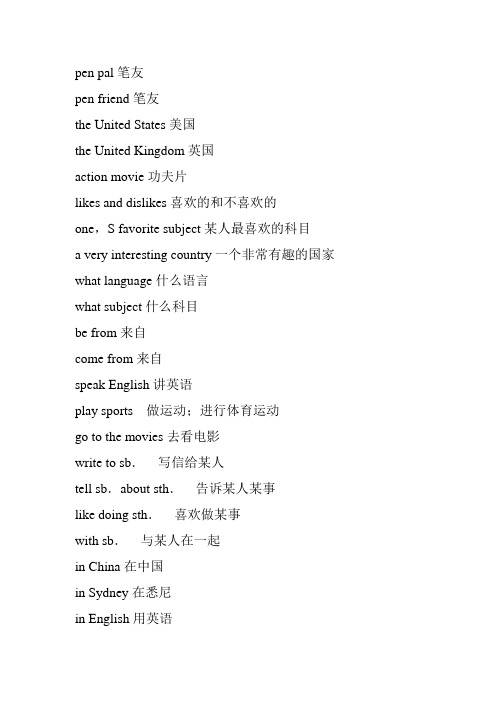
pen pal笔友pen friend笔友the United States美国the United Kingdom英国action movie功夫片likes and dislikes喜欢的和不喜欢的one,S favorite subject某人最喜欢的科目a very interesting country一个非常有趣的国家what language什么语言what subject什么科目be from来自come from来自speak English讲英语play sports 做运动;进行体育运动go to the movies去看电影write to sb.写信给某人tell sb.about sth.告诉某人某事like doing sth.喜欢做某事with sb.与某人在一起in China在中国in Sydney在悉尼in English用英语on weekdays在工作日on weekends在周末on Wednesday在星期三a little一点点post office 邮局pay phone投币式公用电话Bridge Street桥街First Avenue第一大街,第一林荫道garden tour公园旅行the beginning of...……的开始the way to…(某地)到……(某地)的路a place to have fun一个可以玩得愉快的地方have fun玩得愉快have a good trip旅行过得愉快enjoy doing sth.喜欢做某事go through穿过;横过go straight直直往前走go down往下走;顺着……往下走turn left 向左转turn right向右转take a walk散步play the guitar弹吉他across from在……的对面in front of在……的前面in the front of在……(教室等内部)的前面between…and…在……和……之间next to在……的旁边near hear在附近in the neighborhood在附近on a busy street在一条拥挤的街上on the right在右边next Sunday下星期天You’re welcome!没什么!不用谢! Excuse me! 打扰一下!对不起!what animals什么动物what other animals别的什么动物South Africa南非some giraffes一些长颈鹿many leaves许多(片)叶子Let’s see…让我们去看看……want to do sth.想要去做某事like doing sth.喜欢做某事like to do sth.喜欢(很想)去做某事play with与……一起玩耍get up起床look at看着……;朝……看be from来自be friendly to对……友好Please be quiet.请安静。
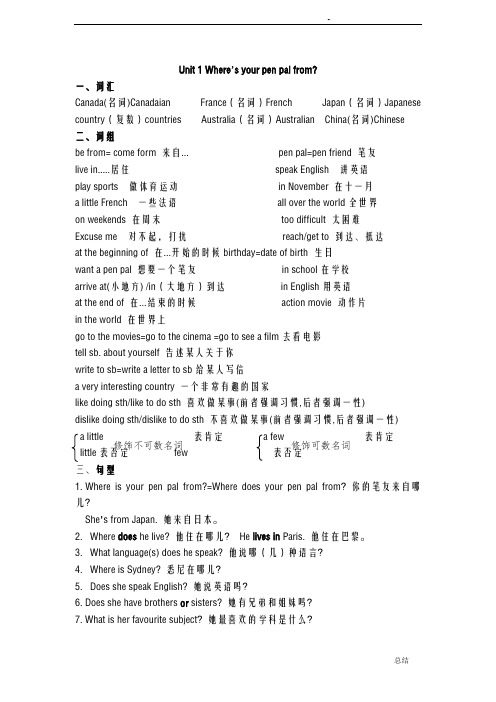
Unit 1 Where’s your pen pal from?一、词汇Canada(名词)Canadaian France(名词)French Japan(名词)Japanese country(复数)countries Australia(名词)Australian China(名词)Chinese 二、词组be from= come form 来自... pen pal=pen friend 笔友live in…..居住speak English 讲英语play sports 做体育运动in November 在十一月a little French 一些法语all over the world全世界on weekends 在周末too difficult 太困难Excuse me 对不起,打扰reach/get to 到达、抵达at the beginning of 在...开始的时候birthday=date of birth 生日want a pen pal 想要一个笔友in school在学校arrive at(小地方) /in(大地方)到达in English用英语at the end of 在...结束的时候action movie 动作片in the world 在世界上go to the movies=go to the cinema =go to see a film去看电影tell sb. about yourself 告述某人关于你write to sb=write a letter to sb给某人写信a very interesting country 一个非常有趣的国家like doing sth/like to do sth 喜欢做某事(前者强调习惯,后者强调一性)dislike doing sth/dislike to do sth 不喜欢做某事(前者强调习惯,后者强调一性)1.Where is your pen pal from?=Where does your pen pal from?你的笔友来自哪儿?She’s from Japan. 她来自日本。
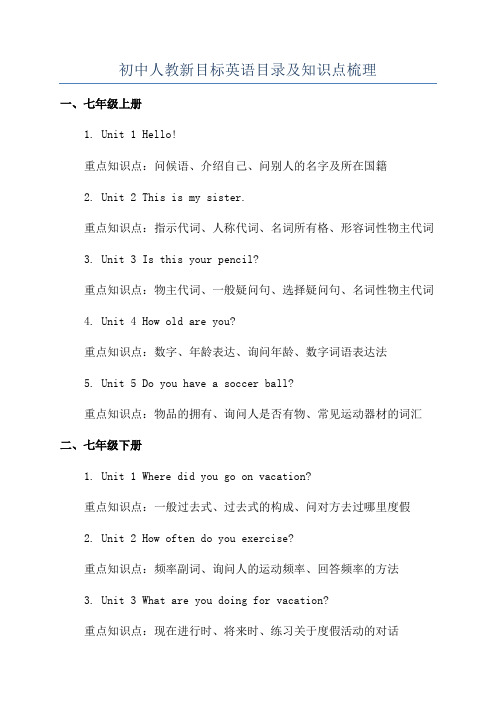
初中人教新目标英语目录及知识点梳理一、七年级上册1. Unit 1 Hello!重点知识点:问候语、介绍自己、问别人的名字及所在国籍2. Unit 2 This is my sister.重点知识点:指示代词、人称代词、名词所有格、形容词性物主代词3. Unit 3 Is this your pencil?重点知识点:物主代词、一般疑问句、选择疑问句、名词性物主代词4. Unit 4 How old are you?重点知识点:数字、年龄表达、询问年龄、数字词语表达法5. Unit 5 Do you have a soccer ball?重点知识点:物品的拥有、询问人是否有物、常见运动器材的词汇二、七年级下册1. Unit 1 Where did you go on vacation?重点知识点:一般过去式、过去式的构成、问对方去过哪里度假2. Unit 2 How often do you exercise?重点知识点:频率副词、询问人的运动频率、回答频率的方法3. Unit 3 What are you doing for vacation?重点知识点:现在进行时、将来时、练习关于度假活动的对话4. Unit 4 I want to be an actor.重点知识点:职业相关词汇、介绍自己的职业梦想、询问对方的职业梦想5. Unit 5 Do you want to watch a game show?重点知识点:表示愿望和意愿的动词短语、邀请别人做事、回答邀请的方法三、八年级上册1. Unit 1 How do you study for a test?重点知识点:询问他人学习方法、回答他人学习方法、谈论自己的学习方法2. Unit 2 I used to be afraid of the dark.重点知识点:used to句型的用法、谈论过去的变化与习惯3. Unit 3 What were you doing when the UFO arrived?重点知识点:过去进行时、询问过去的情况、谈论过去正在进行的活动4. Unit 4 I wanted to be an actress.重点知识点:过去的愿望与打算、表示过去的动词形式、谈论过去的梦想与打算5. Unit 5 What's the highest mountain in the world?重点知识点:地理相关词汇、谈论地理事物、描述自然地理特征四、八年级下册1. Unit 1 How often do you exercise?重点知识点:谈论自己的健康习惯、询问别人的健康习惯、回答健康习惯的问题2. Unit 2 I think that mooncakes are delicious.重点知识点:表达个人观点的句型、谈论个人观点、询问他人观点3. Unit 3 What were you doing when it started to rain?重点知识点:过去进行时与过去时的区分、谈论过去的活动与情况4. Unit 4 He said I was hard-working.重点知识点:间接引语、直接引语转述、谈论他人的言论5. Unit 5 It must belong to Carla.重点知识点:情态动词must、可能性的推测、推测物的归属五、九年级上册重点知识点:谈论学习方法、提出建议、回应建议2. Unit 2 I think that reading is boring.重点知识点:表达个人观点的句型、谈论个人观点、询问他人观点重点知识点:将来时态的构成、谈论未来事物、预测未来技术4. Unit 4 What would you do?重点知识点:与条件虚拟语气相关的动词短语、假设句型的构成、谈论虚拟情况5. Unit 5 Nelson Mandela-a modern hero重点知识点:人物介绍、描述人物特点、探讨社会问题以上是初中人教新目标英语的目录及部分重要知识点的梳理。

七年级英语下册重点短语和语法归纳总结七年级英语下册重点短语和语法归纳总结现如今,英语是非常重要的知识,下面是店铺收集整理的七年级英语下册重点短语和语法归纳总结,希望大家喜欢。
Unit 1 Where’s your pen pal from?一、词组be from= come form 来自...pen pal=pen friend 笔友like and dislike 好恶;爱憎live in….在...居住speak English 讲英语play sports 做体育运动a little French 一些法语go to the movies 去看电影an action movie 一部动作片on weekends 在周末Excuse me 对不起,打扰get to 到达、抵达beginning of 在...开始的时候at the end of 在...结束的时候arrive at /二、句型(1)、Where主 +be+主语+from?主语+be+from+地点.(2)、Where do/does+主语+live?主语+live/lives in…(3)、What language do/does +主语+speak?主语+speak/speaks….(4)、主语+like/likes+doing…三、日常交际用语1-Where is your pen pal from?-He’s from China.2-Where does she live?--She lives in Tokyo.3-Does she speak English?-Yes,she does/No,she dosen’t.4-Is that your new pen pal?-Yes,he is /No,he isn’t.5-What language does she speak? -She speaks English.Unit 2 Where’s the post office一、词组post office 邮局pay phone 投币式公用电话next to 在...隔壁across from 在...对面in front of 在...前面between…and… 在...和...之间on a street 在街上in the neighborhood 在附近on the right/left 在右边/在左边on one’s right/left 在某人的右边/左边turn right/left 向右/左转take a walk 散步have fun 玩得开心the way to …去...的路take a taxi 打的/乘出租车go down(along)…沿着...走go through...穿过...have a good trip 旅途愉快二、句型(1)、Is there a bank near here?Yes,there is .It’s on Centre Street.No,there isn’t.(2)、Where’s the sumpermarket?It’s next to the library.(3)、Bridge Street is a good place to have fun.(4)、I hope you have a good trip.(5)、If you are hungry,you can buy food in the restaurant.(6)、Talk a walk though the park..(7)、enjoy后接名词或动词-ing形式.Do you enoy(=like) your work?Do you enjoy(=like) living in the city?三、日常交际用语(1)、Is there a ….?句型Eg:-Excuse me.Is there a hotel in the neighborhood.-Yes, there is. No.there isn’t(2)、Where is …?句型Eg:-Where is the park,please?-It’s behind the bank.(肯定回答)-I’m sorry I don’t know. (否定回答)(3)、Which is the way to +地点? 句型.例如:- Which is the way to the library.(4)、How can I get to +地点?句型.例如:-How can I get to the restaurant?(5)、Can you tell me the way to +地点?句型.例- Can you tell me the way to the post office?(6)、Let me tell you the way to my house.(7)、Just go straight and turn left.Unit 3 Why do you like koalas?一、词组want to do sth .想要做某事want sb to do sth 想要某做某事want sth 想要某物Let sb do sth 让某人做某事kind of 有几分种类a kind of 一种……years old …年龄如:ten years old 十岁like to do sth 喜欢做某事like doing sthplay with … 与...一起玩be quiet 安静during the day 在白天at night 在夜间have a look at.. 看...one…the other 一个...另一个...二、句型(1)、-why do you like pandas?-Because they’re very cure.(2)、-Why dose he like koalas?-Because they are kind of interesting.(3)、-Where are lions from?-Lions are from South Africa.(4)、-What animals do you like?-I like elephants.三、日常交际用语(1)、-Let’s see the lions.(2)-Why do you want to see the lions? -Becase they are very cute.(3)-Do you like giraffes?Yes,I do./ No,I don’t(4)-What other animal do you like?_I like dogs.tooother+ 名词的复数.表示没有特定的数量范围the other+名词的复数表示有特定的数量范围.(5)-Why are you looking at me?-Because you are very cute.(6)-Let us play games. CGreat!Let me see.Unit 4 I want to be an actor.一、词组want to be+职业想要成为...shop assistant 店员bank clerk 银行职员work with 与...一起工作work hard 努力工作work for 为...而工作work as 作为..而工作get.. from…从...获得...give sth.to.sb /give.sb.sth 把某物给某人正确的表示:give it/them to sb.错误的表示:give sb.it/themin the day 在白天at night 在夜间talk to /with 与…讲话go out to dinners 外出吃饭in a hospital 在医院newspaper reporter 报社记者movie actor 电影演员二、句型(1)-What do/does+某人+do?例:-What do you do?-I’m a student.-What dose he do? He’s a teacher.(2)-What do/does+某人+want to be?例:What do you want to be?-I want to be a teacher. -What does she want to be ?She want to be a nuser.(3)-Where does your sister work?-She works in a hospital.(4)-Does he work in the hospiatYes.he does/No,he doesn’t(5)-Does she work late?-Yes,she does/No.she doesn’t(6)-英语中询问职业的几种表达方式:What do/does …do?What is…? What is your father?What’s one’s job?例:What’s your father’s job? Unit 5 I’m watching TV.一、词组do homework 做家庭作业watch TV 看电视eat dinner 吃饭;就餐clean the room 打扫房间read newspaper/a book 看报纸/看书go to the movies 看电影write a letter 写信wait for 等待;等候talk about 谈论·······play basketball/soccer/ 打篮球/踢足球take photos 拍照TV show 电视节目Some of······中的一些a photo of my family 我的家庭照at school 在学校be with 和·····一起in the tree 在树上二、句型(1)-What+be+主语+doing? ….正在做什么?-主语+be+doing·。

人教版初中英语七年级下册unit 11milk, cow, horse, feed, farmer, quite, anything, grow, farm, pick, excellent, countryside, yesterday, flower, worry, sun, museum, fire, exciting, lovely, expensive, cheap, slow, fast, robot, guide, gift, everything, dark, hear1. mi lk[mɪlk]n. v. 牛奶挤牛奶常考短语milk a cow 挤牛奶经典例句I usually have milk for breakfast.我经常早餐喝牛奶。
2. cow [kaʊ]n. 奶牛经典例句Remember to feed the cow when you are free.记得有空的时候喂一下奶牛。
3. horse [hɔːs]n. 马经典例句The horse is s trong and runs very fast.那匹马很强壮并且跑得很快。
4.feed [fiːd]v. 喂养,喂词形变化过去式,过去分词:fed常考短语feed on 用…喂养;靠吃…过活真题例句We tidy the clinic, and feed and clean the animals.我们收拾了诊所,然后喂养并清洗了那些动物。
5.farmer ['fɑːmə(r)]n. 农夫;农场主词形变化farm n.农场真题例句People should be grateful to a kindhearted farmer named Dan West.人们应该要对一个叫做丹﹒威斯特的好心农民心存感激。
6. quite [kwaɪt]adv. 相当,很常考短语quite a few 相当多真题例句Tom, a twelve – year – old boy, can speak English quite well.汤姆,一个12岁的男孩,能说英语说得很好。
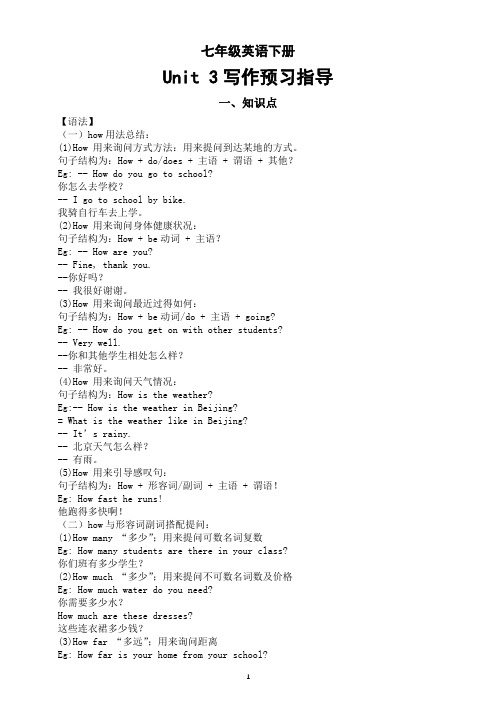
七年级英语下册Unit 3写作预习指导一、知识点【语法】(一)how用法总结:(1)How 用来询问方式方法:用来提问到达某地的方式。
句子结构为:How + do/does + 主语 + 谓语 + 其他?Eg: -- How do you go to school?你怎么去学校?-- I go to school by bike.我骑自行车去上学。
(2)How 用来询问身体健康状况:句子结构为:How + be动词 + 主语?Eg: -- How are you?-- Fine, thank you.--你好吗?-- 我很好谢谢。
(3)How 用来询问最近过得如何:句子结构为:How + be动词/do + 主语 + going?Eg: -- How do you get on with other students?-- Very well.--你和其他学生相处怎么样?-- 非常好。
(4)How 用来询问天气情况:句子结构为:How is the weather?Eg:-- How is the weather in Beijing?= What is the weather like in Beijing?-- It’s rainy.-- 北京天气怎么样?-- 有雨。
(5)How 用来引导感叹句:句子结构为:How + 形容词/副词 + 主语 + 谓语!Eg: How fast he runs!他跑得多快啊!(二)how与形容词副词搭配提问:(1)How many “多少”;用来提问可数名词复数Eg: How many students are there in your class?你们班有多少学生?(2)How much “多少”;用来提问不可数名词数及价格Eg: How much water do you need?你需要多少水?How much are these dresses?这些连衣裙多少钱?(3)How far “多远”;用来询问距离Eg: How far is your home from your school?你家离学校多远?(4)How long “多长时间”;用来询问时间长短或物体长度Eg: How long does it take you to get to school?你花多长时间到学校?How long is the ruler?这把尺多长?(5)How often “多久一次”;用来询问频率Eg: How often do you exercise?你多久锻炼一次?(6)How soon “多久之后”;用来询问时间段Eg: How soon will you be back?你多久回来?(7)How old “多大”;用来询问年龄Eg: How old are you ?你多大了?(8)How about “怎么样”;用来提建议或咨询建议Eg: How about this one?这个怎么样?【知识讲解】1.Drive作动词时,意为“开车;推动;驱赶”常用结构:drive sb.to 地点“某人开车去某地”Eg: My father drives me to school.“我爸爸开车送我去学校。
Unit 11、be/come from:来自2、live in Paris:住在巴黎3、write to me soon:快点给我写信4、play sports:运动、锻炼5、speak a little French:讲一点法语6、like going to the movies with my friends: 喜欢和我的朋友去看电影7、tell sb about...告诉某人关于、、、、、、8、in/at school 在学校9、likes and dislikes:好恶、爱憎* tell, talk, say, speak 的区别(《中考备战策略》P4, 《试题研究》P8)* and 和or 表同类连接的时候,and 用于肯定句,or 用于否定句。
* interesting&interested 的区别。
interesting 用于修饰物,interested 用于修饰人。
同类还有,exciting & excited, relaxing & relaxed, _______________________?Unit 21、打扰了Excuse me2、散步 take a walk3、玩的开心 have fun4、向左/右转 turn left/right5、一直走go straight6、穿过公园 go through the park7、在右边on the right8、在你的左边on your left9、欢迎来中国 Welcome to China10、……的开始 the beginning of …11、世界之旅world tour12、饭店隔壁 next to the restaurant13、乘出租车 take/have a taxi / by taxi14、沿着长街走 go down /along/up Long Street15、在新公园右转 turn right at New Park17、旅途愉快have a good trip18、去学校的路 the way to school19、邮局:post office20、公用电话:pay phone21、在一个安静/繁忙的街道上on a quiet/busy street22、在附近near here=in the neighborhood23、在你家附近near your home24、有花园的房子… a house with a garden25、一个玩的高兴的好地方a good palce to have fun26、让某人做某事let sb. do sth.* there be 句型there be 句型和have 的区别:there be 表示在某地存在某物;have 表示“拥有”,具有所有权。
there be 就近原则:there be 后紧接的第一个名词是单数,be 动词用is/was;后紧接第一个名词是复数,be 动词用are/were.* 方位介词:next to ____, in front of _____, between…and…_______, behind______, across from ______on 后接路名,表示在某条路上,在某条街道上。
* in front of 和in the front of 的区别:in front of 表示空间范围外的“前面”,in the front of 表示空间范围内的“前面”。
e.g. Gina is in front of Lucy.The teacher is in the front of the classroom.* have fun = have a good time = enjoy oneself 表示“玩的开心”。
后接动词时,接动词ing 形式。
* enjoy sth.享受某物/ enjoy doing sth.享受做某事/ enjoy oneself玩的开心* 表示“到达”的三种表达方式及区别:get to, arrive in/at, reach(《试题研究》P12)Unit 31、let sb do sth.让某人做某事2、kind of=a bit =a little 稍微、有点3、南非:South Africa4、对某人友好:be friendly to sb5、保持安静:be/keep quiet6、在白天:during/in the day7、在晚上:at night8、每天:every day9、和朋友一起玩:play with one's friends10、起床:get up11、吃叶子:eat leaves* kind of 可表示“有一点”,相当于a little, a bit, a little bit. “kind ”也可以做名词,表示“种类”,为可数名词。
e.g.一种树,a kind of trees; 几种树,some kinds of trees.* other& elseother 修饰名词,放在名词之前;else 修饰特殊疑问词或不定代词、不定副词,放在其后。
e.g. other animals, something else, what else…* every day & everydayevery day 是词组,表“每天”;everyday 是形容词,表“日常的”。
Unit 41、和某人一起工作:work with sb2、在、、、、、、工做:work at/in.....3、为、、、、、、工作:work for...4、作为、、、、、、工作:work as …5、给某人某物:give sth to sb=give sb sth6、从、、、、得到、、、、:get sth from ....7、有点危险:kind of dangerous8、和某人交谈:talk to/with sb9、谈论、、、、、:talk about sb/sth10、工作得晚:work late11、做某事迟到:be late for sth.12、出去就餐:go out to dinners13、忙于做、、、:be busy with sth=be busy doing sth14、对、、、、、、、感兴趣:be/become interested in....15、努力工作:work hard16、在医院:in/at a hospital17、很多,许多:a lot of=lots of18、招聘广告:want ads19、参加校园剧的演出:be in the school play20、警官:police officer21、银行职员:bank clerk22、电视台:TV station23、警察局:police station24、流行歌手:pop singer25、尽可能快地:as soon as possible26、在将来:in the future27、5到12岁的孩子children of 5-1228、需要做某事need to do sth.* 问工作的三种方式:What do you do ?/ What is your job?/ What are you ?* want 的用法:want sth. want to do sth. want sb. to do sth.* help 的用法:help sb. (to) do sth. help sb. with sth.* wear/ put on/ dress/ be in 区别(《试题研究》P12;《中考备战策略》P6)Unit 51、看电视:watch TV2、看书:read a book=read books=do some reading3、看电影:go to the movies/ go to see the movies/ see the movies4、做家庭作业:do (one's)homework5、那听起来还不错:That sounds good/nice.6、写信:write a letter7、等候、、、、、:wait for....8、等候某人做某事:wait for sb to do sth9、游泳:swim=have a swim=go swimming10、购物:shop=go shopping=do some shopping11、在图书馆:in the library12、打篮球:play basketball13、谢谢你的来信:Thanks for your letter.14、谢谢某人做某事:thanks/thank sb for doing sth15、在第一张图里:in the first photo16、在游泳池里游泳:swim at the pool17、下一张图片:the next photo18、在家里:at home19、和某人在一起:be with sb20、最后一张图片:the last photo21、我的全家福:a photo of my family22、打电话:talk on the phone23、电视节目:TV show* 现在进行时:用法:表示此时此刻正在发生或进行的动作。
构成:am/ is/ are doing标志词:now作时间状语;以Look! Listen! 开头的句子。
e.g. My mother is watching TV.Unit 61、做晚饭:cook dinnner/supper2、玩电脑游戏:play computer games3、你怎么样?(两人见面时)How's it going?4、相当好:pretty good5、好天气:fine/nice weather6、在雨中:in the rain7、一个有风的晚上:a windy night8、中央电视台:CCTV9、阳光明媚的一天:a beautiful,sunny day10、许多人:many/a lot of /lots of people11、在度假:on vacation(介词)12、在度假:take a vacation(动词)13、拍照:take photos=take a photo14、躺在沙滩上:lie on the beach 正躺在沙滩上:be lying on the beach15、一群学生:a group of students16、打沙滩排球:play beach volleyball17、看上去很酷/漂亮/年轻:look cool/beautiful/young18、在高温下/在这么热的天:in this heat19、戴围巾:wear scarfs* 问天气的两种问法:How’s the weather?What’s the weather like?* surprise的几种用法:be surprised at sth. be surprised to do sth. be surprised + that 从句to one’s surprise* other/ the other/ others/ the others/ another的区别(《中考备战策略》P6-7)Unit 71.medium height/build:中等高度/身材2.look like:看起来象(表外貌)3.be like:像。